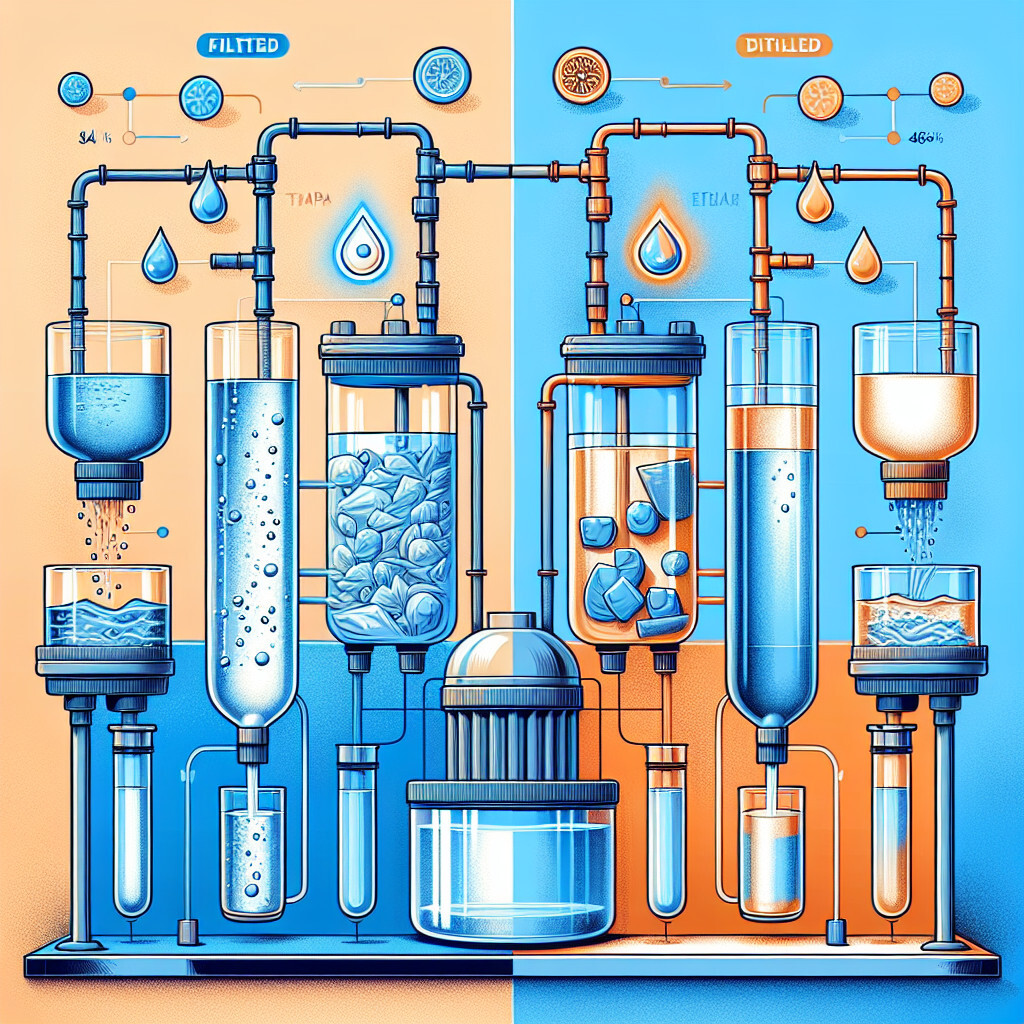-
Table of Contents
- Introduction
- Understanding the Differences: Filtered Tap Water vs Distilled Water
- The Science Behind Filtered Tap Water and Distilled Water: A Comparative Study
- Health Implications: Is Drinking Filtered Tap Water the Same as Consuming Distilled Water?
- The Truth about Filtered Tap Water and Distilled Water: Debunking Common Myths
- Q&A
- Conclusion
“Filtered Tap Water and Distilled Water: Similar but Not Identical!”
Introduction

Filtered tap water and distilled water are two different types of purified water. While both undergo processes to remove impurities, the methods and extent of purification differ. Filtered tap water is treated by removing chlorine and other contaminants through a filtration system, often improving taste and odor. On the other hand, distilled water undergoes distillation, a process involving boiling the water and collecting the steam, which leaves behind virtually all forms of impurities. This results in a higher purity level compared to filtered tap water.
Understanding the Differences: Filtered Tap Water vs Distilled Water
Understanding the differences between filtered tap water and distilled water is crucial in making informed decisions about the water we consume daily. While both types of water undergo processes to remove impurities, the methods and results differ significantly, leading to distinct characteristics and uses for each.
Filtered tap water, as the name suggests, is tap water that has been passed through a filtration system. This process aims to remove contaminants such as chlorine, lead, bacteria, and other harmful substances that may be present in the water. The filtration process varies depending on the type of filter used. Some filters use activated carbon, which attracts and traps many impurities. Others use reverse osmosis, which forces water through a semi-permeable membrane, leaving contaminants behind. The result is water that is cleaner and safer for consumption.
On the other hand, distilled water undergoes a more rigorous process known as distillation. This involves boiling the water and then collecting the steam, which is then condensed back into liquid form. This process removes nearly all impurities, including minerals, salts, and microorganisms. The result is extremely pure water. However, because distillation removes minerals along with contaminants, distilled water can taste flat to some people.
While both filtered tap water and distilled water are safe for consumption, they are not exactly the same. Filtered water retains some of the minerals found in tap water, which can enhance the taste and potentially provide some health benefits. These minerals include calcium and magnesium, which are essential for human health. On the contrary, distilled water, due to its lack of minerals, does not offer these benefits.
Moreover, the purity of distilled water makes it ideal for certain uses where mineral content could be problematic. For instance, it is often used in laboratories, automotive cooling systems, and in the production of cosmetics and pharmaceuticals. It’s also used in medical procedures and equipment sterilization, where the presence of any impurities could interfere with results or pose a health risk.
However, for everyday drinking, many people prefer filtered tap water. Not only does it often taste better due to the retained minerals, but it’s also more environmentally friendly. The process of distillation requires a significant amount of energy to boil the water, making it less sustainable than filtration. Furthermore, the filtration systems can be installed directly onto a tap, making it a more convenient option for many households.
In conclusion, while filtered tap water and distilled water both offer safe options for consumption, they are not the same. Filtered tap water retains some minerals and is more environmentally friendly, making it a popular choice for daily use. Distilled water, being highly pure, is preferred for specific applications where even the smallest amount of impurity could be detrimental. Understanding these differences can help individuals make informed decisions about the water they consume and use in various applications.
The Science Behind Filtered Tap Water and Distilled Water: A Comparative Study
Water is a fundamental necessity for life, and its quality significantly impacts our health and wellbeing. Two common types of water that people consume are filtered tap water and distilled water. While they may seem similar, there are distinct differences between them, rooted in their respective purification processes and the resulting composition.
Filtered tap water, as the name suggests, is tap water that has undergone filtration to remove impurities. The filtration process typically involves passing the water through a series of physical barriers or chemical processes. These barriers are designed to trap and eliminate contaminants such as bacteria, algae, viruses, fungi, minerals, and man-made pollutants that may be present in the water. The specific contaminants that a filter can remove depend on its design. Some filters are designed to remove particular contaminants, while others are more general in their filtration capabilities.
On the other hand, distilled water undergoes a more rigorous purification process. Distillation involves boiling the water and then condensing the steam back into a liquid in a separate container. This process removes impurities, including those that may not be eliminated by filtration, such as certain chemicals and heavy metals. The result is water that is in its purest form, free from virtually all contaminants.
However, it’s important to note that while distilled water is purer, it also lacks the minerals found in filtered tap water. During the distillation process, beneficial minerals such as calcium and magnesium are also removed along with the impurities. These minerals are essential for various bodily functions and contribute to the taste of the water. Filtered tap water, on the other hand, retains these minerals, making it not only safe to drink but also potentially more beneficial for health.
The taste difference between filtered tap water and distilled water is another point of distinction. Many people find that distilled water tastes flat due to the absence of minerals. In contrast, filtered tap water retains the minerals that give water its taste, making it more palatable to many people.
In terms of safety, both filtered tap water and distilled water are generally safe to drink. However, the safety of filtered tap water can depend on the quality of the tap water source and the effectiveness of the filter used. If the tap water source is heavily contaminated or the filter is not designed to remove certain contaminants, filtered tap water may still contain harmful substances. Distilled water, due to its rigorous purification process, is generally free from harmful contaminants.
In conclusion, while filtered tap water and distilled water may seem similar, they are distinct in their composition, taste, and the processes used to purify them. Filtered tap water retains beneficial minerals and has a more natural taste, while distilled water is purer but lacks these minerals and may taste flat. The choice between the two often depends on individual preferences and needs. For those who prioritize purity, distilled water may be the preferred choice. However, for those who value the presence of natural minerals and taste, filtered tap water may be more suitable.
Health Implications: Is Drinking Filtered Tap Water the Same as Consuming Distilled Water?
Water is a fundamental necessity for life, and its quality significantly impacts our health. As such, the question of whether filtered tap water is the same as distilled water is not only a matter of taste or preference but also a matter of health implications.
To begin with, it is essential to understand the difference between filtered tap water and distilled water. Filtered tap water is the water that has been treated to remove impurities such as chlorine, lead, and bacteria. This is typically achieved through activated carbon filters, ceramic filters, or reverse osmosis systems. On the other hand, distilled water is water that has been boiled into vapor and then condensed back into liquid in a separate container. This process removes impurities and minerals from the water.
The primary difference between the two lies in the purification process and the substances removed. While both methods aim to eliminate contaminants, distillation removes nearly all substances, including beneficial minerals like calcium and magnesium. Filtered tap water, however, retains these essential minerals while removing harmful contaminants.
From a health perspective, both filtered tap water and distilled water are safe to drink. However, the absence of minerals in distilled water can have implications on the body’s mineral balance. Minerals in water contribute to the daily dietary intake of these essential nutrients. Therefore, consistently consuming distilled water could potentially lead to a mineral deficiency, especially if one’s diet is not adequately compensating for this loss.
On the other hand, filtered tap water retains these minerals, providing a source of essential nutrients. Moreover, filtered tap water also removes harmful contaminants that could pose health risks. For instance, lead, a common contaminant in tap water, can cause serious health problems, especially in children. By removing such contaminants, filtered tap water ensures a safer drinking option.
However, it’s important to note that the effectiveness of water filters can vary. Some may not remove all types of contaminants, and their efficiency can decrease over time if not properly maintained. Therefore, it’s crucial to regularly replace filters and consider the specific contaminants present in your local tap water when choosing a filter.
In contrast, distillation consistently removes nearly all substances, making it a reliable method for producing pure water. However, the process is energy-intensive and may not be the most environmentally friendly option. Additionally, distilled water can have a flat taste due to the absence of minerals, which some people may find unappealing.
In conclusion, while both filtered tap water and distilled water provide safe drinking options, they are not the same. Filtered tap water retains beneficial minerals and removes harmful contaminants, making it a healthy choice. Distilled water, while pure, lacks these essential minerals and may impact the body’s mineral balance if consumed consistently. Therefore, the choice between filtered tap water and distilled water should consider not only taste and convenience but also the potential health implications.
The Truth about Filtered Tap Water and Distilled Water: Debunking Common Myths
The debate between filtered tap water and distilled water has been a topic of discussion for many years. Many people often wonder if these two types of water are the same or if one is superior to the other. This article aims to debunk common myths and misconceptions surrounding filtered tap water and distilled water, providing a clear understanding of their differences and similarities.
Filtered tap water, as the name suggests, is tap water that has undergone a filtration process to remove impurities. This process typically involves the use of activated carbon or other materials to absorb contaminants such as chlorine, lead, and bacteria. The result is water that is cleaner and safer for consumption than unfiltered tap water. However, it’s important to note that the effectiveness of the filtration process can vary greatly depending on the quality of the filter used. Some filters may not be able to remove certain types of contaminants, such as certain chemicals or heavy metals.
On the other hand, distilled water is water that has been boiled into steam and then condensed back into liquid in a separate container. This process, known as distillation, removes impurities including bacteria, viruses, and chemicals. Distilled water is often used in laboratories and medical facilities due to its high purity level. However, it’s worth noting that while distillation removes harmful contaminants, it also removes beneficial minerals such as calcium and magnesium, which are essential for human health.
So, is filtered tap water the same as distilled water? The simple answer is no. While both types of water undergo processes to remove impurities, the methods used and the resulting water quality are different. Filtered tap water retains beneficial minerals that are essential for our health, while distilled water does not. Moreover, the taste of these two types of water can also be different. Filtered tap water tends to have a more natural taste as it retains some of the minerals found in water. In contrast, distilled water can taste flat or bland due to the absence of these minerals.
However, it’s important to note that both filtered tap water and distilled water are generally safe for consumption. The choice between the two often comes down to personal preference and specific needs. For instance, if you live in an area with heavily contaminated tap water, distillation may be a better option to ensure the water’s safety. On the other hand, if your tap water is relatively clean and you want to retain the beneficial minerals, a good quality water filter would be a suitable choice.
In conclusion, while filtered tap water and distilled water both aim to provide clean and safe water, they are not the same. Each has its own advantages and disadvantages, and the choice between the two should be based on individual needs and circumstances. It’s always advisable to research and understand the quality of your tap water and the effectiveness of different water treatment options before making a decision.
Q&A
1. Question: Is filtered tap water the same as distilled water?
Answer: No, filtered tap water and distilled water are not the same.
2. Question: What is the difference between filtered tap water and distilled water?
Answer: Filtered tap water has been passed through filters to remove impurities, while distilled water has been boiled into vapor and condensed back into liquid in a separate container, removing all impurities and minerals.
3. Question: Does filtered tap water contain minerals?
Answer: Yes, filtered tap water typically still contains some minerals, unlike distilled water which has had all minerals removed.
4. Question: Can filtered tap water be used in place of distilled water?
Answer: It depends on the application. For some uses, such as drinking, cooking, or watering plants, filtered tap water can be used. However, for certain applications that require pure water, like some medical or scientific procedures, distilled water is necessary.
Conclusion
No, filtered tap water is not the same as distilled water. While both are safer to drink than unfiltered tap water, they undergo different processes. Filtered water removes impurities and contaminants without removing minerals, while distilled water undergoes a process of evaporation and condensation, removing all minerals and impurities, resulting in pure H2O.






